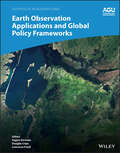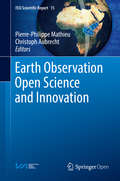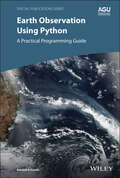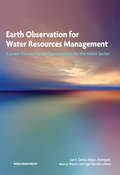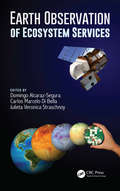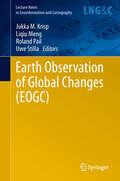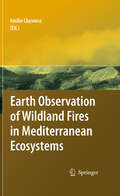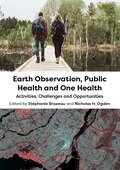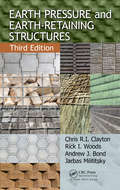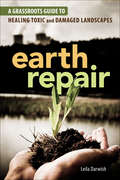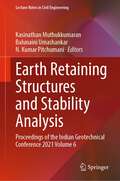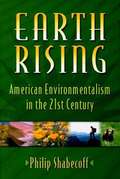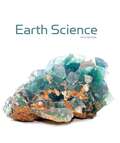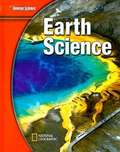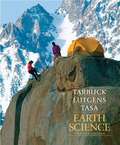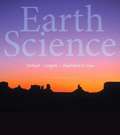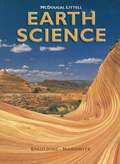- Table View
- List View
Earth Observation Applications and Global Policy Frameworks (Geophysical Monograph Series #274)
by Argyro Kavvada Douglas Cripe Lawrence FriedlEarth Observation Applications and Global Policy Frameworks GEOPHYSICAL MONOGRAPH SERIES Earth Observation Applications and Global Policy Frameworks Data and insights from Earth observations are critical for assessing the health of our planet, monitoring change, and addressing societal challenges from the local to the global scale. Earth Observation Applications and Global Policy Frameworks presents case studies of Earth science information integrated with statistics and socioeconomic data for managing development targets, improving disaster resilience, and mitigating and adapting to climate change. It also showcases open collaboration among researchers, United Nations and government officials, entrepreneurs, and the public. Volume highlights include: Case studies of projects working with local and national governments, and through public-private partnerships, to make the most of the large volume of complex and diverse Earth science information sources Applications from diverse disciplines including wetland preservation, food security, water quality, marine conservation, disasters, urbanization, drought and land degradation, and greenhouse gas monitoring Examples of internationally coordinated initiatives that are driving progress on three landmark United Nations agreements Resources for decision-makers and practitioners in local and national governments The American Geophysical Union promotes discovery in Earth and space science for the benefit of humanity. Its publications disseminate scientific knowledge and provide resources for researchers, students, and professionals.
Earth Observation Open Science and Innovation (ISSI Scientific Report Series #15)
by Pierre-Philippe Mathieu Christoph AubrechtThis book is published open access under a CC BY 4. 0 license. Over the past decades, rapid developments in digital and sensing technologies, such as the Cloud, Web and Internet of Things, have dramatically changed the way we live and work. The digital transformation is revolutionizing our ability to monitor our planet and transforming the way we access, process and exploit Earth Observation data from satellites. This book reviews these megatrends and their implications for the Earth Observation community as well as the wider data economy. It provides insight into new paradigms of Open Science and Innovation applied to space data, which are characterized by openness, access to large volume of complex data, wide availability of new community tools, new techniques for big data analytics such as Artificial Intelligence, unprecedented level of computing power, and new types of collaboration among researchers, innovators, entrepreneurs and citizen scientists. In addition, this book aims to provide readers with some reflections on the future of Earth Observation, highlighting through a series of use cases not just the new opportunities created by the New Space revolution, but also the new challenges that must be addressed in order to make the most of the large volume of complex and diverse data delivered by the new generation of satellites.
Earth Observation Using Python: A Practical Programming Guide (Special Publications #75)
by Rebekah B. EsmailiLearn basic Python programming to create functional and effective visualizations from earth observation satellite data sets Thousands of satellite datasets are freely available online, but scientists need the right tools to efficiently analyze data and share results. Python has easy-to-learn syntax and thousands of libraries to perform common Earth science programming tasks. Earth Observation Using Python: A Practical Programming Guide presents an example-driven collection of basic methods, applications, and visualizations to process satellite data sets for Earth science research. Gain Python fluency using real data and case studies Read and write common scientific data formats, like netCDF, HDF, and GRIB2 Create 3-dimensional maps of dust, fire, vegetation indices and more Learn to adjust satellite imagery resolution, apply quality control, and handle big files Develop useful workflows and learn to share code using version control Acquire skills using online interactive code available for all examples in the book The American Geophysical Union promotes discovery in Earth and space science for the benefit of humanity. Its publications disseminate scientific knowledge and provide resources for researchers, students, and professionals.
Earth Observation for Water Resources Management: Current Use and Future Opportunities for the Water Sector
by Luis Garcãa Pakulski Marcus Wijnen Diego RodrãguezWater systems are building blocks for poverty alleviation, shared growth, sustainable development, and green growth strategies. They require data from in-situ observation networks. Budgetary and other constraints have taken a toll on their operation and there are many regions in the world where the data are scarce or unreliable. Increasingly, remote sensing satellite-based earth observation is becoming an alternative. This book briefly describes some key global water challenges, perspectives for remote sensing approaches, and their importance for water resources-related activities. It describes eight key types of water resources management variables, a list of sensors that can produce such information, and a description of existing data products with examples. Earth Observation for Water Resources Management provides a series of practical guidelines that can be used by project leaders to decide whether remote sensing may be useful for the problem at hand and suitable data sources to consider if so. The book concludes with a review of the literature on reliability statistics of remote-sensed estimations.
Earth Observation of Ecosystem Services (Earth Observation of Global Changes)
by Domingo Alcaraz-Segura Carlos Marcelo Di Bella Julieta Veronica StraschnoyA balanced review of differing approaches based on remote sensing tools and methods to assess and monitor biodiversity, carbon and water cycles, and the energy balance of terrestrial ecosystem. Earth Observation of Ecosystem Services highlights the advantages Earth observation technologies offer for quantifying and monitoring multiple ecosystem fun
Earth Observation of Global Changes (EOGC)
by Jukka M. Krisp Liqiu Meng Roland Pail Uwe StillaThis book provides a collection of selected articles that have been submitted to the Earth Observation and Global Changes (EOGC2011) Conference. All articles have been carefully reviewed by an international board of top-level experts. The book covers a wide variety of topics including Physical Geodesy, Photogrammetry & Remote Sensing, High-Resolution and Fast-Revisiting Remote Sensing Satellite Systems, Global Change & Change Detection, Spatial Modelling, GIS & Geovisualization. The articles document concrete results of current studies related to Earth Sciences. The book is intended for researchers and experts working in the area of Spatial Data Analysis, Environmental Monitoring/Analysis, Global Change Monitoring and related fields.
Earth Observation of Wildland Fires in Mediterranean Ecosystems
by Emilio ChuviecoWildland fires are becoming one of the most critical environmental factors affecting a wide range of ecosystems worldwide. In Mediterranean ecosystems (including also South-Africa, California, parts of Chile and Australia), wildland fires are recurrent phenomena every summer, following the seasonal drought. As a result of changes in traditional land use practices, and the impact of recent climate warming, fires have more negative impacts in the last years, threatening lives, socio-economic and ecological values. The book describes the ecological context of fires in the Mediterranean ecosystems, and provides methods to observe fire danger conditions and fire impacts using Earth Observation and Geographic Information System technologies.
Earth Observation, Public Health and One Health: Activities, Challenges and Opportunities
by Brazeau Stéphanie Nicholas H. OgdenThis book reviews the contributions of Earth Observation (EO) to public health practices. It examines how EO is being used to understand, track, predict, and manage infectious and chronic diseases, and it provides discussion on the current challenges and the significant development potential of EO to a One Health approach. Its objective is to address a set of questions: How does EO currently assist public health activities? What are the challenges for operational use of EO in public health? What are the opportunities for EO to benefit public health in the near future? This review concentrates on the following priority themes to which EO and geomatics can make important contributions: mosquito-borne and tick-borne diseases; water-borne diseases; air quality and extreme heat effects; and geospatial indicators of vulnerable human populations. EO has also demonstrated potential during the COVID-19 pandemic as an efficient provider of data on rapid environmental and socio-economic changes and impacts. Remotely sensed data are particularly useful for risk modelling and mapping projects to help generate information on occurrence and spatio-temporal trends of disease risk. Similarly, EO can be used to identify risk factors for disease risk or emergence detected in surveillance, and support development of early warning systems. Risk maps enable public health professionals to anticipate and prepare for health threats, and they can support responses to infectious disease epidemics or existing endemic conditions. This book emerged from the collaboration of the Public Health Agency of Canada and the Canadian Space Agency with contributions of international experts. Their findings will be of great value to public health and EO professionals interested in developing and applying geospatial applications in the risk assessment and management of public health issues.
Earth Pressure and Earth-Retaining Structures
by Chris R.I. Clayton Rick I. Woods Jarbas MilititskyEffectively Calculate the Pressures of SoilWhen it comes to designing and constructing retaining structures that are safe and durable, understanding the interaction between soil and structure is at the foundation of it all. Laying down the groundwork for the non-specialists looking to gain an understanding of the background and issues surrounding g
Earth Repair: A Grassroots Guide to Healing Toxic and Damaged Landscapes
by Leila DarwishMillions of acres of land have been contaminated by pesticides, improperly handled chemicals, dirty energy projects, toxic waste, and other pollutants in the United States alone. This toxic legacy impacts the environment, our health, our watersheds, and land that could otherwise be used to grow healthy local food and medicines. Conventional clean-up techniques employed by government and industry are tremendously expensive and resource-intensive and can cause further damage. More and more communities find themselves increasingly unable to rely on those companies and governments who created the problems to step in and provide solutions.Earth Repair describes a host of powerful grassroots bioremediation techniques, including:Microbial remediation-using microorganisms to break down and bind contaminantsPhytoremediation-using plants to extract, bind, and transform toxinsMycoremediation-using fungi to clean up contaminated soil and waterPacked with valuable, firsthand information from visionaries in the field, Earth Repair empowers communities and individuals to take action and heal contaminated and damaged land. Encompassing everything from remediating and regenerating abandoned city lots for urban farmers and gardeners to recovering from environmental disasters and industrial catastrophes such as oil spills and nuclear fallout, this fertile toolbox is essential reading for anyone who wishes to transform environmental despair into constructive action.Leila Darwish is a community organizer, urban gardener, and permaculture designer with a focus on using grassroots bioremediation to address environmental justice issues in communities struggling with toxic contamination of their land and drinking water.
Earth Retaining Structures and Stability Analysis: Proceedings of the Indian Geotechnical Conference 2021 Volume 6 (Lecture Notes in Civil Engineering #303)
by Kasinathan Muthukkumaran Balunaini Umashankar N. Kumar PitchumaniThis book comprises the select peer-reviewed proceedings of the Indian Geotechnical Conference (IGC) 2021. The contents focus on Geotechnics for Infrastructure Development and Innovative Applications. This book covers topics geotechnical challenges in tunnel construction, related performance of temporary secant pile wall, soil nail walls, rock-fill embankment dams, performance of MSE wall, stability analysis, dynamic stability and landslide simulations, landslide early warning system, among others. This book is of interest to those in academia and industry. This book is of interest to those in academia and industry.
Earth Rising: American Environmentalism In The 21St Century
by Philip ShabecoffA general history of environmentalism in the United States.
Earth Science
by Robert H. Marshall Allen RosskopfAGS Globe publishes high-interest, low-reading level textbooks, instructional materials, and assessments for students with a wide range of special needs. <P><P>The purpose of this report is to document how AGS Globe textbooks are aligned with scientific research that supports best practices in pedagogy, instructional design, and instructional techniques.
Earth Science
by Rachel Santopietro Bob Jones University Press Staff David M. Quigley Tyler TrometerEarth Science Student Text (5th Edition)
Earth Science
by Edward J. Tarbuck Frederick K. Lutgens Dennis TasaThe latest edition (fifth was 1988) of a broad and nonquantitative survey at the introductory level of topics in geology, oceanography, meteorology, and astronomy.
Earth Science
by Edward J. Tarbuck Frederick K. Lutgens Dennis TasaALERT: Before you purchase, check with your instructor or review your course syllabus to ensure that you select the correct ISBN. Several versions of Pearson's MyLab & Mastering products exist for each title, including customized versions for individual schools, and registrations are not transferable. In addition, you may need a CourseID, provided by your instructor, to register for and use Pearson's MyLab & Mastering products. Packages Access codes for Pearson's MyLab & Mastering products may not be included when purchasing or renting from companies other than Pearson; check with the seller before completing your purchase. Used or rental books If you rent or purchase a used book with an access code, the access code may have been redeemed previously and you may have to purchase a new access code. Access codes Access codes that are purchased from sellers other than Pearson carry a higher risk of being either the wrong ISBN or a previously redeemed code. Check with the seller prior to purchase. -- Ideal for undergraduates with little or no science background, Earth Science is a student-friendly overview of our physical environment that offers balanced, up-to-date coverage of geology, oceanography, astronomy, and meteorology. The authors focus on readability, with clear, example-driven explanations of concepts and events. The Thirteenth Edition incorporates a new active learning approach, a fully updated visual program, and is available for the first time with MasteringGeology--the most complete, easy-to-use, engaging tutorial and assessment tool available, and also entirely new to the Earth science course. Used by over a million science students, the Mastering platform is the most effective and widely used online tutorial, homework, and assessment system for the sciences. This is the product access code card for MasteringGeology(tm) and does not include the actual bound book. Pearson eText gives you access to the text whenever and wherever you can access the Internet. The eText pages look exactly like the printed text, and include powerful interactive and customization functions. This does not include the actual bound book.
Earth Science
by Dinah Zike Ralph M. Feather Susan Leach SnyderWith a broad array of innovative print and technology resources, Glencoe "Earth Science" helps teachers differentiate and accommodate all learners. The range of labs, content area reading, discussion strategies, note-taking tools, and activities provides students with multiple experiences of each Science Benchmark. They give teachers flexibility and the ability to monitor student progress through ongoing assessment..
Earth Science
by Dinah Zike Ralph M. Feather Susan Leach Snyder McGraw-Hill-Glencoe StaffWith a broad array of innovative print and technology resources, Glencoe Earth Science helps teachers differentiate and accommodate all learners. The range of labs, content area reading, discussion strategies, note-taking tools, and activities provides students with multiple experiences of each Science Benchmark. They give teachers flexibility and the ability to monitor student progress through ongoing assessment.
Earth Science
by Edward J. Tarbuck Frederick K. LutgensIdeal for undergraduates with little or no science background, Earth Science provides a student-friendly overview of our physical environment that offers balanced, up-to-date coverage of geology, oceanography, astronomy, and meteorology. The authors’ texts have always been recognized for their readability, currency, dynamic art program, delivery of basic principles and instructor flexibility. The Fourteenth Edition incorporates a new active learning approach, a fully updated and mobile visual program, and MasteringGeology™–the most complete, easy-to-use, engaging tutorial and assessment tool available.
Earth Science
by James Sammons Mary Beth Abel Hughes Scott EddlemanEarth science includes the studies of geology, meteorology, astronomy, and oceanography. Each field involves scientists and engineers using math and technology to answer scientific questions and solve problems.
